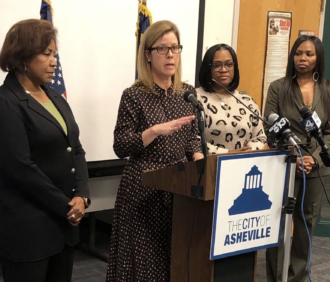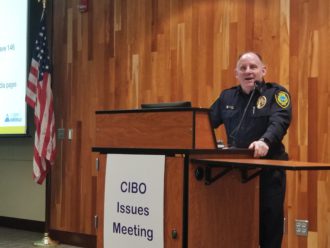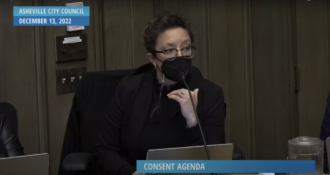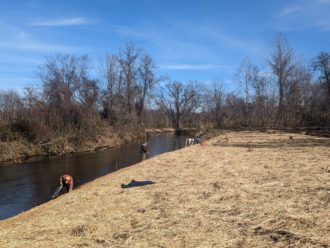North Carolina can support as many as nine Las Vegas-style casinos with gambling throughout the state, including one in the Asheville area, according to a report commissioned by the General Assembly.


North Carolina can support as many as nine Las Vegas-style casinos with gambling throughout the state, including one in the Asheville area, according to a report commissioned by the General Assembly.

The reparations commission unanimously approved a recommendation for the city of Asheville and Buncombe County to “stop further harm” to the Black community by “ceasing the repetition of institutional processes that lead to racially disparate outcomes.” The audit is meant to ensure that such harms have actually ceased and that local governments are in compliance with applicable laws and regulations.

The proposed audit, presented to the Buncombe County Board of Commissioners on Jan. 17, would look at whether the city and county are complying with “federal and state laws, regulatory bodies, codes of conduct, court orders and consent degrees,” with a focus on damage caused to the Black community by noncompliance.

The new plans call for three buildings with a combined total of 585,360 square feet, as well as 463 parking spaces and truck loading docks. The project is tentatively scheduled to come before Asheville City Council for final approval on Tuesday, Jan. 24, where the public will be allowed to provide further input.

For at least five years, Asheville City Council members have debated and grappled with some of the most pressing issues facing Asheville in regularly scheduled private meetings with city staff — meetings that are outside of public view.

During their meeting of Jan. 12, members of the Buncombe County Board of Education unanimously approved a resolution that supports amending the state’s school calendar law. The document blasts the current law for a range of woes, from learning loss to difficulty in providing teacher training.

On Dec. 30, the nonprofit completed the purchase of 34 acres in Brevard to expand the preserve. The new land will bolster the existing 395-acre park, owned by the city of Brevard, which connects to the Pisgah National Forest.

Asheville’s water may be restored, but the spigot of information from city officials is still clogged.

Asheville City Council will consider establishing an “independent review committee to analyze the events and circumstances leading up to, and throughout the duration of, the recent prolonged water outage.” The group would evaluate Asheville’s emergency response, identify infrastructure needs and recommend policy changes to make the city more resilient.

Asheville Police Department Chief David Zack and Vice Mayor Sandra Kilgore filled in the Asheville-based trade group Jan. 6 about the city’s recent efforts to address dozens of vacancies among the APD’s patrol staff.

During the Jan. 3 meeting of the Buncombe County Board of Commissioners, Asheville Mayor Esther Manheimer fielded questions about the chain of events that left tens of thousands without water over the Christmas and New Year’s holidays.

Xpress reached out to the area’s elected officials, activists and community leaders to learn more about what they took away from 2022’s political action.

Waste Pro, Buncombe’s waste management contractor, will bump the rate it charges customers for trash pickup by $1.62 per month at the start of the year. On Tuesday, Jan. 3, the company will also ask the county Board of Commissioners to authorize an additional rate hike of 39 cents per month in light of higher recyclable processing costs.

Xpress asked activists, law enforcement leaders, government officials and others to weigh in on how local crime and related issues shaped the past year.

The Winter Safe Shelter program at Asheville Primary School, as explained by Counterflow Asheville, will prioritize families, LGBTQ people and residents who are Black, Indigenous or people of color. The shelter plans to operate nightly through the end of March, housing up to 10 people per night with space for another 10 support staff on site.

At the request of Council member Kim Roney, six consent agenda items pertaining to the Asheville Police Department were singled out for discussion and separate votes. Over an hour of deliberation and public comment followed.

Backed by a $400,000 grant from the N.C. Land and Water Fund, the nonprofit Mills River Partnership is restoring roughly 14 acres of riverside near the plant. Maria Wise, the nonprofit’s executive director, says her organization will stabilize the riverbanks and replace invasive plants with native varieties.

Released nearly 5 years ahead of schedule, the former Buncombe County manager readies for another legal fight.

Asheville City Council will consider making changes to the Housing Trust Fund policy to try to meet the challenges and costs of today’s housing market and the community’s needs during its meeting of Tuesday, Dec. 13.

At the Asheville Planning and Zoning Commission meeting at 5 p.m. Wednesday, Dec. 7., Alex Cole of the city’s Planning and Urban Design department will share new details on the African American Heritage Resource Survey and Burton Street Architectural Survey.

Asheville on Bikes has recently drawn attention for its successful advocacy at City Hall, but it’s just one of many community organizations that seek to pull the levers of political power in Asheville. Xpress spoke to several of these groups to learn more about how they pursue their agendas.